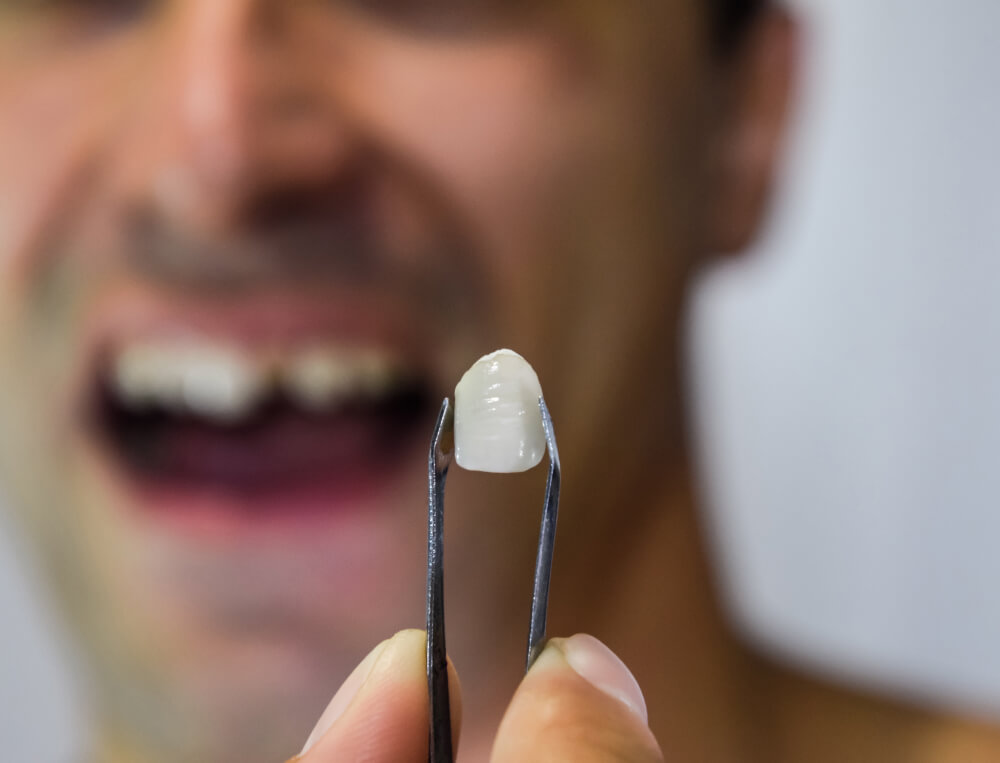A dental crown is designed to restore and protect a damaged tooth, but what happens if it unexpectedly falls out? While it may not always be painful, a missing crown leaves your tooth exposed and vulnerable to further damage, decay, and sensitivity. This article explores why crowns fall out, what immediate actions you should take, temporary solutions to protect your tooth, and how to prevent future crown failures.
Why Do Dental Crowns Fall Out?
A dental crown is meant to be a durable, long-term solution, but several factors can cause it to loosen or fall out. One of the most common reasons is the natural wear and tear that occurs over time. Crowns experience constant pressure from chewing, grinding, and biting, which can weaken the bonding cement and lead to detachment.
Another common cause is eating sticky or hard foods. Chewing on caramel, taffy, or gum can pull the crown loose, while hard foods like ice, nuts, or hard candy can create enough force to dislodge it entirely. Poor dental hygiene can also contribute to crown failure. If plaque and bacteria accumulate around the base of the crown, they can lead to decay in the underlying tooth, weakening the structure that holds the crown in place.
Sometimes, the crown itself may have been improperly fitted or bonded during placement. If the original adhesive fails or if the crown was not properly seated, it may become loose over time. Additionally, teeth grinding or clenching, known as bruxism, can place excessive stress on a crown, gradually wearing it down and making it more likely to fall out. In some cases, dental trauma from an accident or a sudden impact to the mouth can also knock a crown loose. Understanding these causes can help prevent crown failures and ensure long-lasting dental restorations.
Immediate Steps to Take When Your Dental Crown Falls Out
If your dental crown falls out, acting quickly can help protect your tooth and improve the chances of reattaching the crown. Whether it happens while eating, brushing, or unexpectedly, following these steps can prevent further damage and discomfort before you see your dentist.
- Retrieve the crown – If possible, locate the crown and inspect it for damage. Avoid touching the inside of the crown, as this could interfere with its ability to be reattached.
- Rinse your mouth and the crown – Use warm water to rinse your mouth and clean the crown. This helps remove food particles and bacteria, reducing the risk of infection or irritation.
- Store the crown safely – If the crown is intact, place it in a small container or a sealed plastic bag to bring to your dentist. In some cases, the same crown can be re-cemented without needing a replacement.
- Protect the exposed tooth – If the underlying tooth is sensitive, cover it with dental wax or sugar-free gum to prevent irritation. Avoid chewing on that side to minimize discomfort.
- Use temporary dental cement if necessary – Over-the-counter dental cement can be used to temporarily secure the crown until you see your dentist. Avoid using household glues, as they are not safe for oral use.
- Schedule an appointment as soon as possible – A lost crown should be addressed quickly to prevent further damage or shifting of the tooth. Contact your dentist right away to discuss the next steps.
Temporary Fixes for a Lost Crown Before Seeing a Dentist
If your dental crown falls out and you’re unable to see a dentist immediately, there are a few temporary solutions to protect your tooth and reduce discomfort. These short-term fixes can help prevent further damage while ensuring that the exposed tooth remains safe until a professional can assess and reattach the crown.
One of the most effective temporary solutions is using over-the-counter dental cement, which is available at most pharmacies. This product is designed specifically for temporary dental repairs and can be used to hold the crown in place until your appointment. Before applying the cement, clean the inside of the crown and the affected tooth thoroughly, then follow the instructions for securing the crown back onto the tooth.
If dental cement isn’t available, petroleum jelly or toothpaste can serve as a temporary adhesive. While not as strong as dental cement, they can help hold the crown in place for a short period, especially when eating or drinking. If the tooth is too sensitive or the crown cannot be placed back, covering the exposed area with dental wax or sugar-free gum can help protect it from irritation.
It’s essential to avoid chewing on the affected side and to stick to soft foods until your dental visit. These temporary solutions can provide relief, but they are not a substitute for professional treatment. Seeking prompt dental care remains the best way to ensure the crown is properly restored.
How to Prevent Future Crown Failures
Taking proactive steps can help extend the lifespan of your dental crown and reduce the risk of it falling out again. Proper care and maintenance are essential to keeping your crown securely in place while protecting the underlying tooth structure.
Good oral hygiene is the foundation of crown longevity. Brushing twice a day with a fluoride toothpaste and flossing daily helps prevent plaque buildup around the crown, reducing the risk of decay that could weaken its bond. Regular dental checkups allow your dentist to monitor the integrity of the crown and catch any issues early before they lead to failure.
Avoiding sticky and hard foods is another key factor in maintaining a secure crown. Chewing on caramel, gum, or taffy can pull the crown loose, while biting down on hard foods like ice, nuts, or hard candy can crack or dislodge it. Using a nightguard if you grind your teeth at night can also help, as excessive pressure from grinding (bruxism) can weaken both the crown and the bonding material over time.
If you notice any looseness, discomfort, or changes in your bite, it’s important to see your dentist promptly. Early intervention can prevent complete detachment and the need for a costly replacement. With proper care and mindful habits, your dental crown can remain secure and functional for many years.
Conclusion
A lost dental crown may not always cause immediate pain, but it should never be ignored. Acting quickly to protect your tooth, using temporary fixes when needed, and seeking professional care can prevent further complications and ensure the best outcome. Whether your crown fell out due to wear, decay, or an unexpected accident, knowing what to do can make all the difference in preserving your dental health.
At District Dental Solutions, we understand the urgency of a lost crown and are here to provide expert care and solutions tailored to your needs. If your dental crown has fallen out, don’t wait—schedule an appointment with us as soon as possible. Call (202) 955-5787 today, and let our experienced team restore your smile with precision and care.


